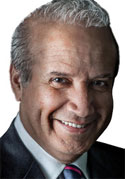Iraq Becoming a Sectarian Minefield

By Abdulrahman Al-Rashed
7 March 2015
Confronting the self-ascribed Islamic State (IS) in Iraq is inevitable because under the current circumstances only two options are left: You chase them or they chase you. There is no border demarcation and no one recognizes the authority of the other. Iraqi forces are taking the lead in the ongoing fight in Tikrit, one of the two most important Iraqi cities seized by the IS militants.
Iraqi forces are also making gains in Saladin province and are likely to free it from the clutches of the terrorists groups but probably for a short period because Iranian forces and sectarian militias back the Iraqi army. Information coming out of these areas suggests sectarian crimes are taking place there.
The liberation of Tikrit and every inch of Iraqi territory is a national duty that expresses the integrity of the state’s authority. The city and its suburbs will remain within the boundaries of the Iraqi state. But if the aim is simply to takeover Tikrit and expel the IS with sectarian infighting and political alliances, it will prove to be a temporary gain and the terrorist organization may return to the city with local support. The war has become sectarian in nature and is being fought along ethnic lines with militias receiving support from Iranian forces intimidating the inhabitants of the besieged regions. The West is supporting most of the military activities on the ground. The US is providing precious intelligence information, observing the movements of terrorists and monitoring the status of the territories under their control. The situation gives an impression of a Shiite-Sunni war, which has nothing to do with the state or liberation of lands from the IS.
Will Iraqi Prime Minister Haider Abadi, who is the supreme commander of the armed forces, be able to stop the sectarian war after the liberation of these areas? Unfortunately, Sunnis are angry with him, though they were happy with his election because he promised to work on reconciliation. They now believe that he is weak.
They fear that the situation will get out of control. They will face the same fate as Syria, where clashes have turned into wars between Alawites and Sunnis, despite the denial of the regime in Damascus. It is now obvious, especially with the involvement of Hezbollah and the Iranian Revolutionary Guard. What is happening in Tikrit and Saladin province is similar to what is happening in Syria.
The Americans should understand the nature of the fighting. They found themselves dragged back to Iraq because of IS’ provocations through heinous crimes and the threat to the Iraqi government during the last days of former Prime Minister Al-Maliki’s term. His administration sustained defeats, which enabled extremists to seize important sites and threatened the capital.
Although the Americans played an active role in the resignation of Al-Maliki, and later acknowledged that his policies were behind the current disasters, they are now fighting in a trench similar to his camp, helping sectarian groups.
They might be able to free all Iraqi territory and eradicate IS and other rebels, but this war will be followed by a sectarian one similar to Syria. How will the US benefit from supporting the Iraqi army without a political process that makes everyone a winner?
The Americans should realize that they have become part of the region’s repugnant sectarianism, fighting alongside Alawites in Syria and Shiites in Iraq, while negotiating with Iran on the nuclear issue. All three scenarios are against Sunnis, or at least this is how it appears. The Americans have put themselves in an unprecedented, terrible trap.
Widening the sectarian wars in the region will not serve the West. Al-Qaeda, IS, Al-Nusrah, Hezbollah, Asaib Ahl Al-Haq and others are nothing but the outcome of such blind fighting. The West should help promote moderate civilian institutions against religious hard-liners; it should not support the latter to achieve victories in wars against temporary opponents.
Source: http://www.arabnews.com/columns/news/714726

No comments:
Post a Comment